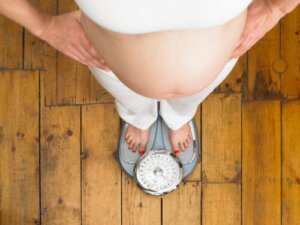How to Lose Weight During Pregnancy Without Affecting the Baby

Many women want to lose weight during pregnancy as they want to maintain their physical appearance and gain as little weight as possible.
However, part of their weight increase is due to the growth of the baby, the placenta, and the amniotic fluid. For this reason, not all these kilos are “extra” but are part of the physiological changes of pregnancy.
With this in mind, we’ll explain how to maintain an adequate weight during pregnancy in order to go through this stage in the best health conditions.
Is it possible to lose weight during pregnancy?
At first glance, losing weight during pregnancy is a contradiction. Anyone knows that the woman’s body undergoes a series of expected physical changes, among which is the growth of the uterus.
This natural increase in body weight occurs gradually and the pounds that women gain in pregnancy vary from one pregnant woman to another.
Generally, the increase in body mass has to do with the characteristics of the mother’s body and the baby. And, on rare occasions, like some multiple pregnancies, the weight doubles.
Therefore, instead of trying to lose weight, what you should do is maintain an adequate weight in relation to your usual weight. And you can achieve this through the strategies that we’ll share with you below.

1. Maintain constant medical control
If you can’t stop thinking about how bad you want to lose weight during pregnancy, then visit a doctor who specializes in nutrition for pregnant women for proper advice.
First of all, you need to know your state of health and how your baby is developing. The best thing to do is carry out all obstetric health checks from the first weeks of gestation.
Read more: Prenatal Checkups During Pregnancy
2. Adopt a healthy diet
Healthy eating habits are essential in order to maintain a healthy life, especially during pregnancy.
Eating healthy is probably not enough to help you lose weight, but it will allow you to maintain normal rates for each stage of pregnancy.
Remember that cravings and the excessive intake of certain types of foods contribute to excess weight. In addition, it increases the likelihood of pregnancy complications, such as gestational diabetes.
Finally, maintaining a healthy diet in pregnancy is also important for your baby, as everything you consume reaches its small developing body. The main objective is to maintain a proper weight, without affecting the life that grows inside you.
You may be interested in: Glucose Test During Pregnancy
3. Get physically active
Most people believe that pregnant women shouldn’t engage in physical activity, which is totally wrong and harmful. Although exercise during pregnancy has some contraindications, in most cases, it’s an extremely important practice.
If the pregnant woman doesn’t perform any type of physical activity, she runs the risk of suffering health problems related to a sedentary lifestyle. Among them, being overweight and other metabolic disorders.
Therefore, the most advisable thing is that you do physical activity frequently, of mild and moderate intensity. We advise you to seek professional advice from a trained trainer, in addition to the endorsement of your obstetrician.
Ideally, you should follow your coach’s recommendations but, generally speaking, you can do activities like swimming, walking, yoga, and Pilates.

Lose weight during pregnancy at any cost?
Rather than trying to lose weight during pregnancy, it’s best to maintain a steady increase in relation to the weight you had before pregnancy. Therefore, you should find out with your obstetrician what’s the expected and healthy increase for you.
If you exceed this value, you may need to rule out some health complications of pregnancy, such as pre-eclampsia. To do so, professional monitoring of your pregnancy is essential.
Some pregnant women make the mistake of adopting unhealthy weight loss strategies during pregnancy, such as “miracle” diets with restrictive nutritional guidelines, or vigorous exercise routines. All of them can put the health of both the mother and the baby at risk.
Many women want to lose weight during pregnancy as they want to maintain their physical appearance and gain as little weight as possible.
However, part of their weight increase is due to the growth of the baby, the placenta, and the amniotic fluid. For this reason, not all these kilos are “extra” but are part of the physiological changes of pregnancy.
With this in mind, we’ll explain how to maintain an adequate weight during pregnancy in order to go through this stage in the best health conditions.
Is it possible to lose weight during pregnancy?
At first glance, losing weight during pregnancy is a contradiction. Anyone knows that the woman’s body undergoes a series of expected physical changes, among which is the growth of the uterus.
This natural increase in body weight occurs gradually and the pounds that women gain in pregnancy vary from one pregnant woman to another.
Generally, the increase in body mass has to do with the characteristics of the mother’s body and the baby. And, on rare occasions, like some multiple pregnancies, the weight doubles.
Therefore, instead of trying to lose weight, what you should do is maintain an adequate weight in relation to your usual weight. And you can achieve this through the strategies that we’ll share with you below.

1. Maintain constant medical control
If you can’t stop thinking about how bad you want to lose weight during pregnancy, then visit a doctor who specializes in nutrition for pregnant women for proper advice.
First of all, you need to know your state of health and how your baby is developing. The best thing to do is carry out all obstetric health checks from the first weeks of gestation.
Read more: Prenatal Checkups During Pregnancy
2. Adopt a healthy diet
Healthy eating habits are essential in order to maintain a healthy life, especially during pregnancy.
Eating healthy is probably not enough to help you lose weight, but it will allow you to maintain normal rates for each stage of pregnancy.
Remember that cravings and the excessive intake of certain types of foods contribute to excess weight. In addition, it increases the likelihood of pregnancy complications, such as gestational diabetes.
Finally, maintaining a healthy diet in pregnancy is also important for your baby, as everything you consume reaches its small developing body. The main objective is to maintain a proper weight, without affecting the life that grows inside you.
You may be interested in: Glucose Test During Pregnancy
3. Get physically active
Most people believe that pregnant women shouldn’t engage in physical activity, which is totally wrong and harmful. Although exercise during pregnancy has some contraindications, in most cases, it’s an extremely important practice.
If the pregnant woman doesn’t perform any type of physical activity, she runs the risk of suffering health problems related to a sedentary lifestyle. Among them, being overweight and other metabolic disorders.
Therefore, the most advisable thing is that you do physical activity frequently, of mild and moderate intensity. We advise you to seek professional advice from a trained trainer, in addition to the endorsement of your obstetrician.
Ideally, you should follow your coach’s recommendations but, generally speaking, you can do activities like swimming, walking, yoga, and Pilates.

Lose weight during pregnancy at any cost?
Rather than trying to lose weight during pregnancy, it’s best to maintain a steady increase in relation to the weight you had before pregnancy. Therefore, you should find out with your obstetrician what’s the expected and healthy increase for you.
If you exceed this value, you may need to rule out some health complications of pregnancy, such as pre-eclampsia. To do so, professional monitoring of your pregnancy is essential.
Some pregnant women make the mistake of adopting unhealthy weight loss strategies during pregnancy, such as “miracle” diets with restrictive nutritional guidelines, or vigorous exercise routines. All of them can put the health of both the mother and the baby at risk.
All cited sources were thoroughly reviewed by our team to ensure their quality, reliability, currency, and validity. The bibliography of this article was considered reliable and of academic or scientific accuracy.
- Paul Carrillo-Mora, Alma García-Franco, María Soto-Lara, Gonzalo Rodríguez-Vásquez, Johendi Pérez-Villalobos & Daniela Martínez-Torres. (2021). Cambios fisiológicos durante el embarazo normal. http://www.scielo.org.mx/scielo.php?script=sci_arttext&pid=S0026-17422021000100039
- Minjarez-Corral, M., Rincón-Gómez, I., Morales-Chomina, Y. A., Espinosa-Velasco, M. de J., Zárate, A., & Hernández-Valencia, M. (2014). Ganancia de peso gestacional como factor de riesgo para desarrollar complicaciones obstétricas. Perinatología y Reproducción Humana. http://www.scielo.org.mx/scielo.php?script=sci_arttext&pid=S0187-53372014000300007
- Koletzko B, Godfrey KM, Poston L, Szajewska H, van Goudoever JB, de Waard M, Brands B, Grivell RM, Deussen AR, Dodd JM, Patro-Golab B, Zalewski BM; EarlyNutrition Project Systematic Review Group. Nutrition During Pregnancy, Lactation and Early Childhood and its Implications for Maternal and Long-Term Child Health: The Early Nutrition Project Recommendations. Ann Nutr Metab. 2019;74(2):93-106. doi: 10.1159/000496471. Epub 2019 Jan 23. PMID: 30673669; PMCID: PMC6397768. https://pubmed.ncbi.nlm.nih.gov/30673669/
This text is provided for informational purposes only and does not replace consultation with a professional. If in doubt, consult your specialist.








